I have every journal I’ve ever written in stored in my closet – there are about ten journals from my teenage years, a handful of pre-teen diaries, and another ten notebooks from my childhood. Lets not forget all the ones I’ve started in the last five years of my adulthood. The picture above isn’t even a quarter of how many notebooks I have!
Writing consistently in journals over such a long span of time gives me a significant timeline of my emotional growth and progress. When I feel like reflecting, analyzing patterns, flipping through memory lane… I have years of journal writing to scan through.
It can be amazing to look back and see my younger self’s perspective. It can also be sad and emotional, but I learn about myself every time. Looking back always fuels my desire to continue documenting my emotions and various events in my life so I can continue to keep looking back at them.
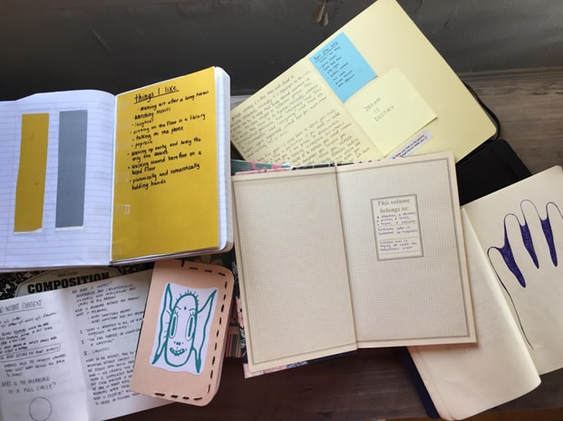
In entering adulthood, ending beautiful and difficult relationships, starting to seeing a new therapist, moving out of my parents’ house, and navigating many other experiences it has become clear that keeping journals was a critical part of understanding myself.
Intentionally write in my journals about specific emotions, distresses, anxieties, relationships, therapy sessions, and more is a critical part of understanding that putting aside time to intentionally write in them about specific emotions, distresses, anxieties, relationships, therapy sessions, and more.
This kind of writing is one way I accomplish emotional work, which is internal + external work I do to support my own healing and recovery from traumatic things I’ve experienced, harmful behaviors I exhibit, and many other conflicts in my life.
Your emotional work or path towards healing may include going to therapy, reading books about mental health or communication, going outside, doing yoga, or something very personal to you. You may not even call it emotional work! That’s what I call some of my journal writing because it gives me an easier way to describe it to others. Sometimes it literally does feel like work, but its impact on my life has been positive and concrete.
Below I’ve photographed several examples of what my emotional work writing looks like. These pages have assisted me when I’ve been struggling to articulate things to myself, my friends, my partners, and my family. I have even taken my “emotional work writing,” these exact pages, into therapy when I felt like my writing would help my therapist understand how I was feeling.
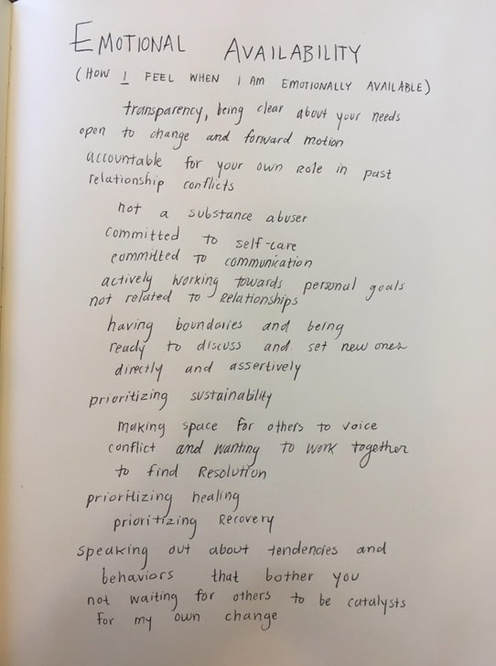
This is a page about my feelings on emotional availability and what it means to me to be emotionally available. Writing out what definitions and feelings felt accurate to me helped me to better understand what behaviors make me feel present and what space my mind is in when I feel emotionally available.
All of this helps me to understand and recognize the patterns I exhibit when I’m not feeling emotionally available. For instance, when I am not prioritizing my own healing, boundaries, or needs, that’s usually a time where I’m not feeling my most present. These are my own personal definitions of emotional availability.
I want to share this page in particular to show how breaking down an idea can help you understand it better. Finding your own definitions which resonate and feel true to you is one of the most important parts of this practice.
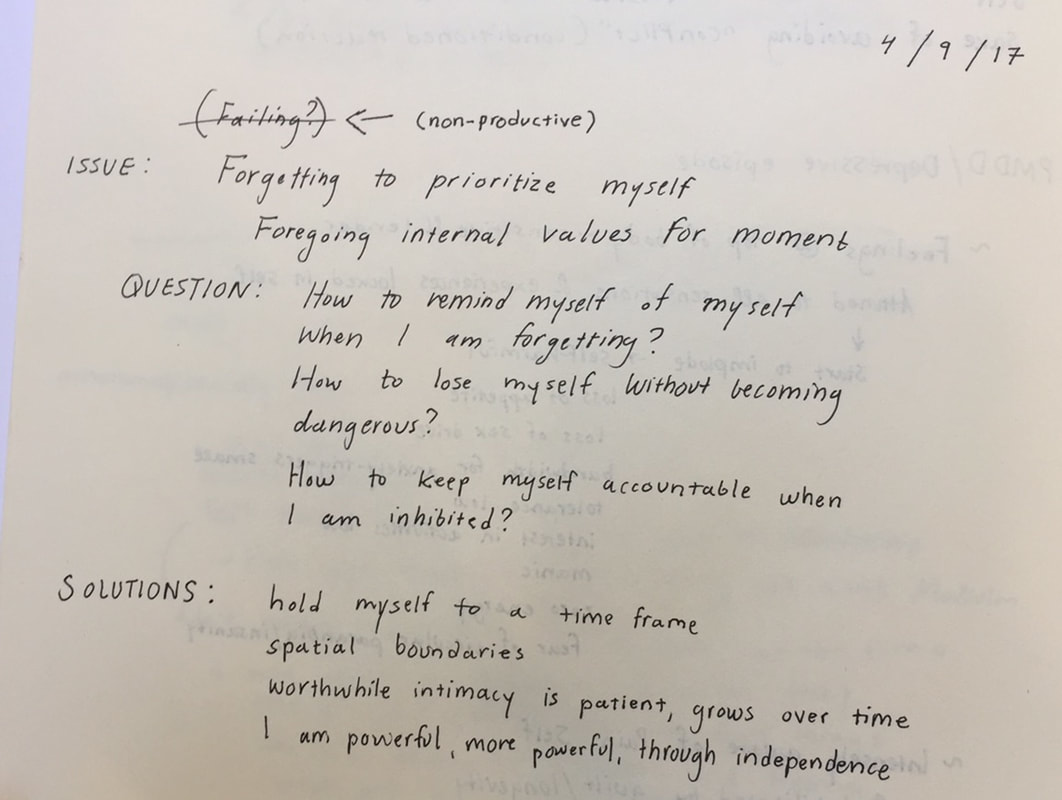
This page is an example of a specific conflict I was struggling to navigate. I was feeling very self-deprecating, and even first began to write “Failing” instead of “Forgetting,” which I crossed out because I realized that was not a productive way to phrase the issue at hand. Then I wrote down some questions to ask myself in the moments of forgetting myself, and challenged myself to think of potential solutions that could help me out. In many relationships, I’ve struggled to stay connected to my own boundaries and needs. Often I’ve felt like the dopamine rush, excitement of a new crush, and separation anxiety was leaving me a little blindsided. Once I started writing it out and compiling some solutions I felt like I was better equipped to navigate the situation. I was also able to talk with my partners about how I was feeling.
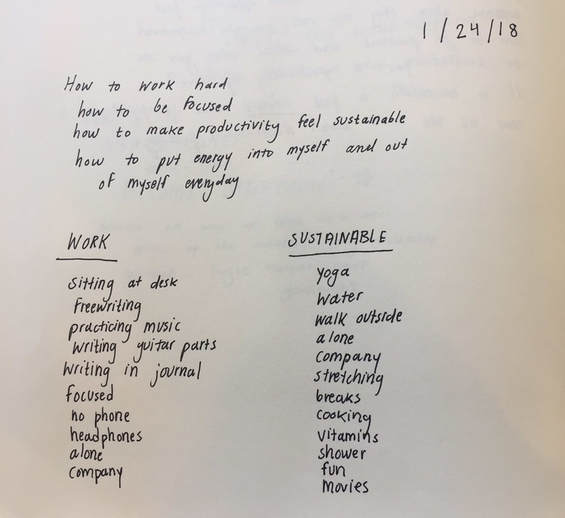
With this page, I wanted to help myself find a balance between my work and a sustainable daily routine. Sometimes I think I can just work everyday all day, but if I do that, then I let my non-work related daily practices fall to the wayside, and I end up feeling worse. I wanted to write down types of sustainable habits I could do when I wasn’t working so I could still feel like I was progressing in other parts of my life. Finding the balance between energy output and input can be quite difficult for me, so these types of lists can be crucial to my success.
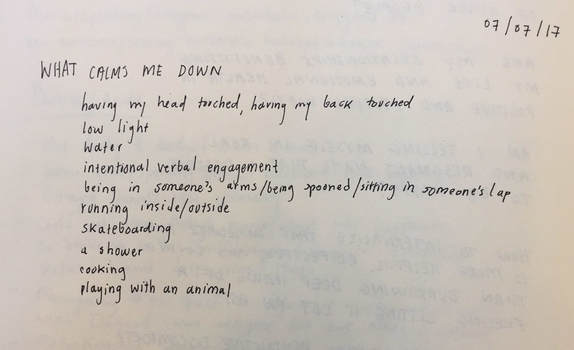
This is a list I was inspired to write after having extreme anxiety in the presence of one of my friends. I wanted a page to look back to and to share with people close to me so they know how to best support me in times of distress. A symptom of my anxiety is often “going non-verbal,” so having a written document that can speak for me is incredibly useful. It also makes it easier to answer the “What can I do to help you?” “What do you need right now?” questions you might be asked when you’re not feeling your best.
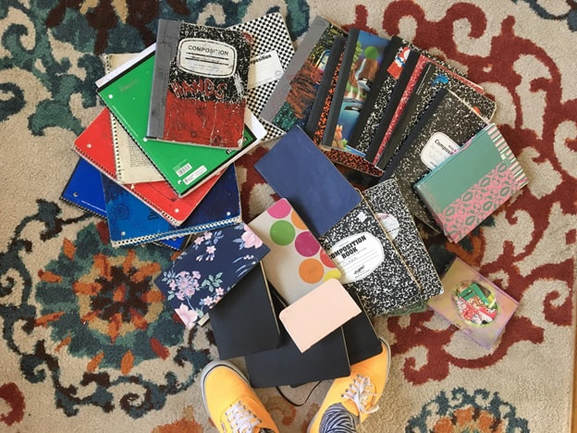
Journaling is a significant part of my self-care routine and I definitely consider it to be a healthy coping mechanism for me. However, not all journaling has to be this specific and intentional to be helpful! Sometimes just writing, scribbling, drawing lines, or even writing the same word over and over can be cathartic and calming. I also encourage you to to journal or document your thoughts in any way that feels most accessible for you – if not a physical journal, maybe an internet blog like Tumblr or Blogger. Penzu also offers some insightful journal prompts if you’re having trouble getting started.
Written by: Clara Zornado
